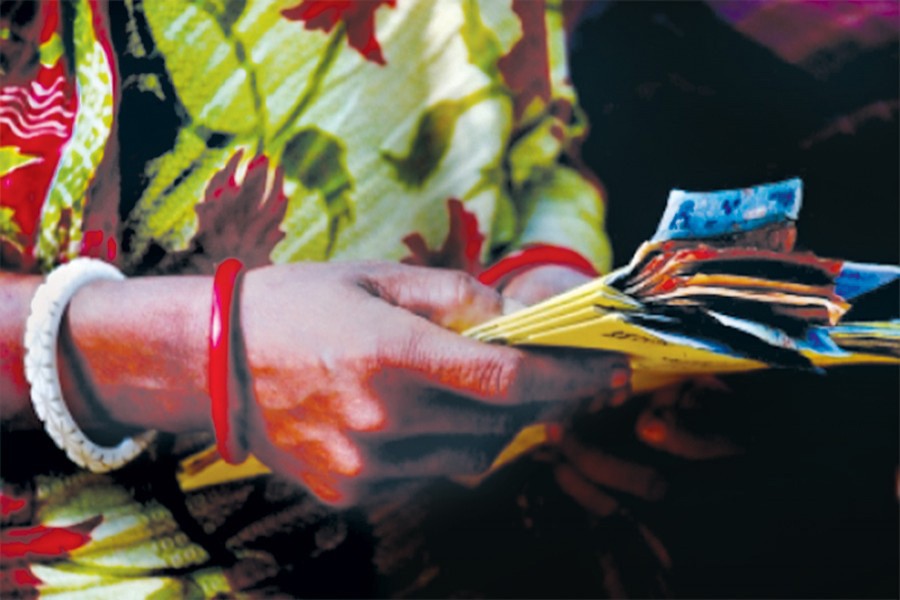Half of Bangladesh adults remain unbanked: WB
Insufficient fund, mistrust cited as reasons

Published :
Updated :

Despite notable expansion of financial services in recent years, just half of Bangladeshis aged 15 or above remain without a bank or mobile money account, a recent World Bank study has said.
The lack of sufficient fund is the most common reason why many people are still shying away from having an account, the WB report said.
The huge gender gap remains in terms of account ownership, it said.
The findings were part of a triennial study called "The Global Findex Database", which is a wide-ranging data set on how people in 144 economies use financial services.
The global lender has produced the report with funding from Bill & Melinda Gates Foundation in collaboration with Gallup, Inc.
The latest edition of Findex, which was unveiled earlier this month, found that around 50 per cent of Bangladeshis, aged 15 or above, have an account-either through a financial institution or a mobile money provider.
This is, however, a significant progress from 2014 when only 31 per cent adult population of the country had an account.
The percentage of people who have an account at a financial institution has also risen during this period-from 29 per cent in 2014 to 41 per cent in 2017.
However, there remains a huge gender gap. While the percentage of men owning an account has risen from 35 per cent to 65 per cent in the last three years, the percentage of women owning an account has increased marginally from 26 per cent to 36 per cent.
Similarly, the percentage of men owning an account at a financial institution has risen from 33 per cent in 2014 to 50 per cent in 2017, while the percentage of women owning an account at a financial institution has risen from merely 25 per cent to 32 per cent during this same period.
"Such trends showcase the low participation of women in entrepreneurship or business activities in the country", banker and economist Khondkar Ibrahim Khaled said when asked about the reason for such a huge gender gap in account ownership.
"Within the grass-roots level, female account ownership is still mostly limited to those who work in the garment sector," Mr Khaled said.
"It is high time for the government we put more emphasis on female entrepreneurship to encourage true economic empowerment of women", the former deputy governor of the central bank said.
Meanwhile, the World Bank study has also found that the insufficient fund was the most commonly cited reason for not owning an account among the Bangladeshi populace.
Analysing the Findex database, it was found that almost 40 per cent of the population coming under the study have cited insufficient funds as the reason for not owning a bank account.
For those who do not own an account at a financial institution, this percentage goes up to 62 per cent.
When asked about such trend, Ibrahim Khaled said, "Despite the significant economic growth in recent years, the fact is that more than 20 per cent population of Bangladesh is still poor while a sizeable amount of people live from hand to mouth."
"For this segment of the population, owning an account is still a luxury", Mr Khaled said adding, "The relatively low uptake of account ownership is a testimony to the persistent economic inequality in the country".
Some 12 per cent of the respondents coming under the World Bank survey said that they do not have any account because someone else in their family has an account while 10 per cent said that the financial services are too expensive. Simultaneously, some nine per cent of the respondents said that they do not have any account because financial institutions are too far away while 7 per cent cited the lack of trust as the main reason for not having an account.
Lack of necessary documentation, lack of need for financial services and religious reasons are some other commonly cited grounds for not having an account among the Bangladeshi populace.
The World Bank study also found that the percentage of Bangladeshis owning a mobile money account has increased seven-fold in the last three years.
While only three per cent of the adult population in the country owned a mobile money account back in 2014, the percentage has increased to 21 per cent by 2017.
The percentage of people who has made or received digital payments has also increased substantially from seven per cent to 34 per cent in the same period.
This increase, however, is part of global phenomenon as the World Bank study noted that "There has been a significant increase in the use of mobile phones and the internet to conduct financial transactions" in recent years.
Between 2014 and 2017, this has contributed to a rise in the share of account owners sending or receiving payments digitally from 67 per cent to 76 per cent globally, and in the developing world from 57 per cent to 70 per cent, it added.
Globally, 1.7 billion adults remain unbanked, yet two-thirds of them own a mobile phone that could help them access financial services.
Digital technology could take advantage of existing cash transactions to bring people into the financial system, the report argued.
mehdi.finexpress@gmail.com


 For all latest news, follow The Financial Express Google News channel.
For all latest news, follow The Financial Express Google News channel.